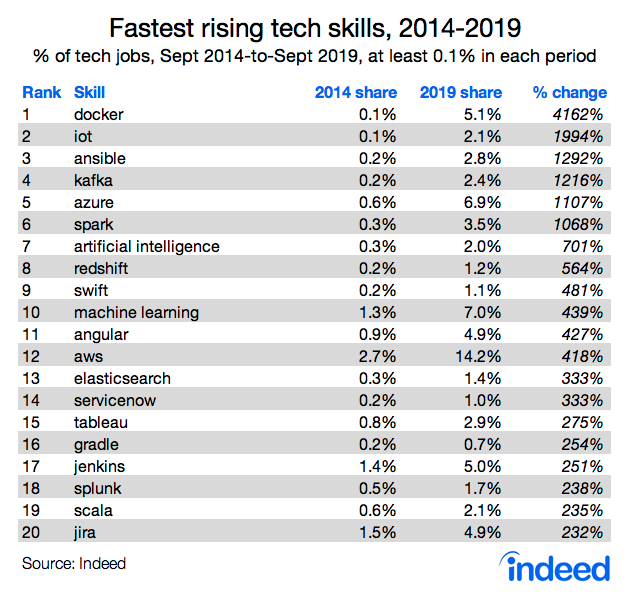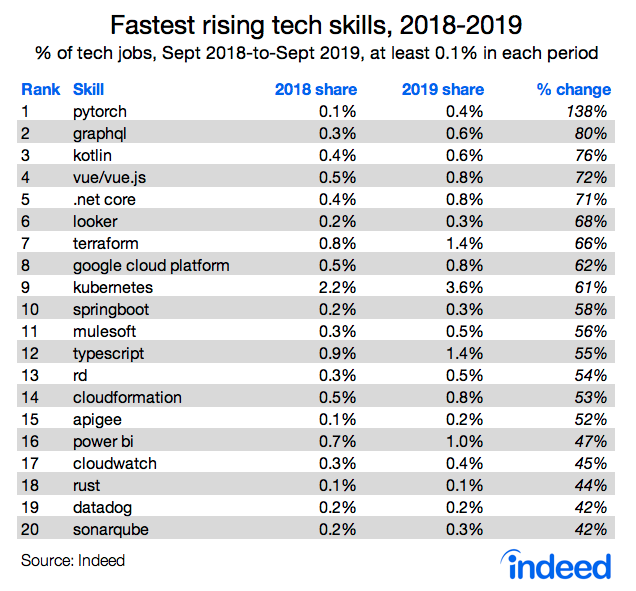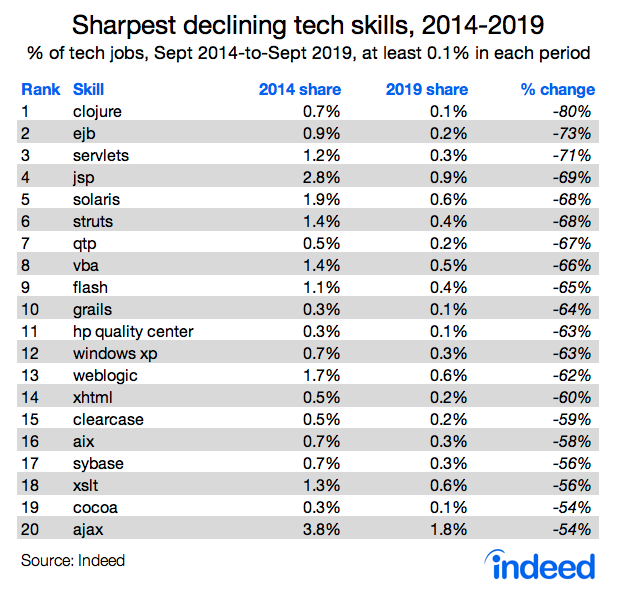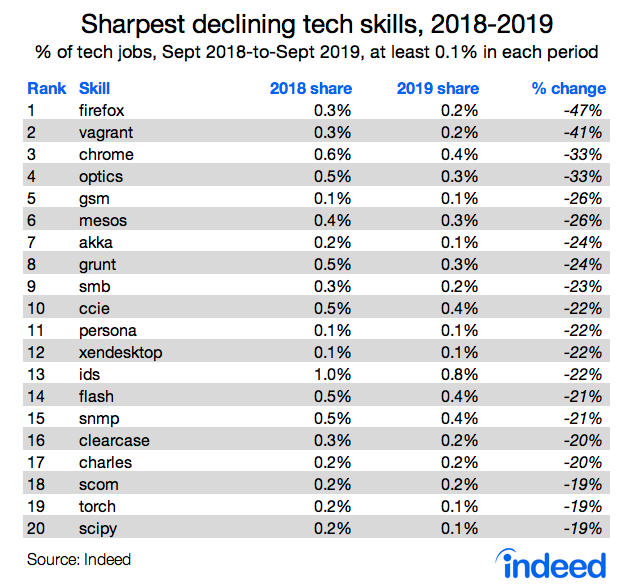This is the second of four parts of the Indeed Tech Skills Explorer – an interactive look at which tech skills are in demand and which tech jobs are using those skills. For these reports, we searched for more than 500 tech skills in US postings for tech jobs on Indeed.com.
Key points:
- The containerization tool Docker is by far the fastest-rising tech skill, rocketing up more than forty-fold from September 2014 to September 2019.
- Five other tech skills boosted their share more than 1,000%, including IoT (internet of things), Ansible, Kafka, Azure, and Spark.
- Clojure dropped the most, down 80%, followed by several once widely-used tech skills that have fallen more than 50%: Servlets, Solaris, Flash, and Ajax.
Tech is constantly changing and so are the tech skills employers are looking for. In just a few years, a new tech tool can surge from infancy to widespread use, while once-prominent tools can fall sharply out of favor. This means that the tech skills employers demand are also constantly shifting.
We previously looked at today’s top tech skills, using millions of US tech jobs posted on Indeed.com. In this post, we examine the fastest-rising and sharpest declining tech skills. We define tech skills broadly, encompassing specific software products such as Oracle, programming languages such as Python, and tech disciplines such as artificial intelligence and internet of things (IoT).
Over the past five years, Docker has been by far the most explosively growing tech skill. The containerization software, developed in 2013, was almost nonexistent in job descriptions in 2014. By September 2019, Docker had risen more than 4,000% and was listed in over 5% of all US tech jobs.
IoT, short for internet of things, was a distant runner-up despite not-too-shabby growth of nearly 2,000%. Ansible and Kafka have also shot up. Ansible — an IT automation, configuration management, and deployment tool — has rocketed almost 1,300% since 2014 and is now mentioned in 2.8% of US tech job descriptions. Kafka, a tool for building real-time data pipelines and streaming apps, has had a similarly strong growth trajectory.

The rise of data science is driving the gains of several skills on our five-year growth list. Azure, Spark, Redshift, and Amazon Web Services (AWS) are all tools for data processing, and each is up at least five-fold. Two data science disciplines — artificial intelligence and machine learning — are in the top 10, up 701% and 439% respectively. The data analysis software Tableau and the programming language Scala are on the top 20 list.
What are the hottest tech skills right now? In the year that ended in September 2019, PyTorch, GraphQL, and Kotlin were the fastest-rising stars, with Vue.js, Google Cloud Platform, and Kubernetes also in the top 10.

As some tech skills soar in popularity, others fall out of favor. Tech has its own form of “creative destruction” in which newer, better tools replace older, inferior ones. The tech skill that has plunged the most since 2014 is the programming language Clojure, which is down 80%. The soon-to-be phased out Flash technology is off 65%.
Among skills that appeared in at least 2% of tech jobs in 2014, JSP (JavaServer Pages) and Ajax have fallen 69% and 54% respectively. Other major tech skills losers over the past five years (not listed in the table) include jQuery, PHP, Ruby, and Ruby on Rails, off 30%, 25%, 6%, and 27% respectively. Check out our interactive tool to explore which tech skills are trending.

In the year that ended in September 2019, the browser Firefox posted the biggest drop, falling 47%. It’s not the only browser on the list. Chrome declined 33%. Meanwhile, Flash was off 21%.

Conclusion
Tech skills are in a constant state of flux, some on the rise, while others fade away. To take one example, five years ago, Ruby on Rails was widely-used for app development. Today it’s much less popular. In contrast, Docker practically didn’t exist, but its explosive growth is quickly making it a common tech skill.
All this means that tech workers and job seekers need to keep their skills sharp and up-to-date. For their part, employers have to stay on top of which skills are most relevant and understand that the ground can shift at warp speed.
Methodology
We use a list of over 500 tech skill terms to query the job descriptions of postings on Indeed.com between September 2014 and September 2019. Only US English language postings having one of these tech job titles were considered. One cautionary note: Multiple skills can appear in the same job description and some terms can appear in multiple distinct skills, like “SQL” and “SQL server.”
In calculating the fastest-rising and sharpest declining skills, we looked at tech skills that appeared in at least 0.1% of tech jobs in both September 2014 and September 2019.






